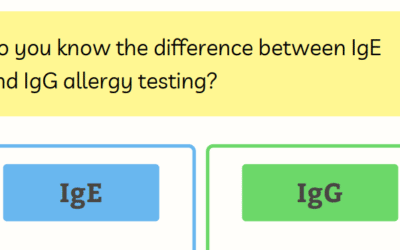Digestive Disorders:
Digestive Disorders Are Common – But Not Normal
Some of the most common issues that we see in our office are digestive disorders. We’ve seen GERD, ulcerative colitis, Crohn’s disease, constipation, diarrhea, gall bladder problems, Irritable Bowel Syndrome, leaky gut, dysbiosis—we’ve seen it all. And like many of my patients, I’ve had my own digestive problems. In fact, this is how I got started as a Natural Health Care Doctor.
My Struggle with Ulcerative Colitis
When I first got into nutritional therapy, I had been suffering with different health issues for years. As a child, I had chronic allergies, chronic asthma, and recurring earaches. I even had trench mouth, a painful condition of infection in my gums that was so bad that I could not eat for a week. All these culminated when I was 17, and I developed ulcerative colitis.
I did not have the best of diets, I was under stress, and one day I felt the urgent need to use the bathroom. To my surprise and dismay, the bowl filled with blood. I honestly thought I was dying and bleeding to death. Soon afterward, I went to see a medical doctor who diagnosed me with ulcerative colitis. Ulcerative colitis is a severe autoimmune digestive disorder. The doctor prescribed a bland diet and medication. It seemed to send the ulcerative colitis into remission, but I still felt sick, and would suffer from flareups intermittently over the next four years.
The Downhill Slide
When I was 21, I went to Mexico on vacation before starting chiropractic school. While I was in Mexico I got violently ill, and was bedridden for two days. It turned out that my ulcerative colitis had come back with a vengeance.
When I got back home to Rochester, New York, I experienced fatigue, bloating, indigestion, and bloody stools. Additionally, I went in for a surgery for an ingrown toenail. My foot was so infected that the doctor had to give me an antibiotic before he would perform the surgery. That night, I spiked a fever of 105°. Yes, you read that right, A fever at 105° at the age of 21. Anybody in the medical field knows that a fever that high, at that age, is extremely dangerous. As a student I did not have health insurance, so my mother-in-law put me in a bathtub filled with ice cubes to get my temperature down. I was so delirious that I believed her when she told me that it was warm water, and I got in. Slowly, sitting in a bathtub full of ice cubes, my temperature came down.
The next day I went to the doctor, and he diagnosed me with salmonellosis. So now I had salmonellosis and ulcerative colitis. My fatigue, bloating, indigestion, and swelling around my belly went to new levels. But the medical doctor assured me that all was well, and that Salmonellosis was a self-limiting infection, and that I would be fine. I took his word for it, and left the office.
About a month later, I still wasn’t feeling right, and started to feel pain in my lower back. Since I was going to chiropractic school in a couple of months, I decided to see the local chiropractor to get my back adjusted. It didn’t help. Little did I know, dysfunction of the large intestine often causes pain in the lower back and hips. I asked him why the adjustments weren’t helping, and he said he did not know. He also said that when I went to chiropractic school, they would x-ray me and give me lab tests to figure out the cause of my chronic pain. I took his word for it and left the office.
When I got to chiropractic school, I thought for sure that someone there would figure out why I had chronic pain in my left low back, why I had gained 10 inches on my waist, had chronic fatigue, and had developed acne (something I had never had before). I went to five clinicians, the dean of clinics, the president of the school, and multiple other doctors for advice over the next three years. At the end, I came to the conclusion that no one could help me. At 24 years of age, I was crippled in pain, was fatigued, had chronic indigestion and ulcerative colitis. I had growing anxiety and depression about my failing health, and I was in quite a pickle. But my luck was about to change – yay!
The Road to Healing My Digestive Disorders Begins
One of my friends told me about a book called “The Zone” by Dr. Barry Sears, which talks about blood sugar disturbances and the foods that cause them. This book deeply resonated with me. I realized that when I ate the foods that he cautioned against, I didn’t feel good, my bloating and gas acted up, and so did my pain. I decided to try the diet that he recommended, which is very much like the diet that I recommend now to people, the Page diet.
Within one week, my crippling back pain stopped. Within two months, my digestive disorders completely healed. My acne vanished. In addition, I had so much energy that I needed about two hours less sleep during the night. I lost about 40 pounds of fat, and 10 inches off my waist. As a side note, my allergies and asthma also left. All of this from diet–who knew?
The Lightbulb Goes On – We Need A Nutritional Therapeutic Approach to Digestive Disorders
When I got out into practice as a chiropractor, I thought I was the only one who needed a serious diet change. But I noticed something curious. Only about 50% of my patients responded miraculously to my chiropractic adjustments, feeling better quickly. In contrast, the other 50% either got better slowly, or did not get better at all. When I asked them about their diet, I found that most of them were eating things that they should not be eating. As a result these poor-quality foods were affecting their digestion and keeping them from improving.
You see, these patients had digestive disorders that were affecting their health, and causing pain in their body, just as I had. As a chiropractor, I decided not to focus solely on the spine, but the whole health of the body. That is how I started practicing therapeutic nutrition with Nutrition Response Testing and functional blood chemistry.
Over the years now and beginning with my own case, I have seen many people with digestive disorders.
I have found that in nearly all these cases there are certain issues that need to be addressed.
These are:
1. Food Allergies
In all cases—yes, all cases that I’ve seen, if someone has digestive disorders, they have some degree of food allergies. It blows my mind that this is still a mystery to many people in the medical field. Just because they have not developed blood tests that are completely accurate yet for food allergies does not mean that food allergies do not exist for the vast number of patients with digestive disorders! We use Nutrition Response Testing and blood tests to find, locate, and handle these food allergies for quick, effective relief.
2. Chronic Immune Stress
Many people suffer from chronic immune system issues. Blood chemistry is useful in identifying issues with immune function. We have found best results can be obtained by using blood testing and muscle testing in combination to pinpoint different immune stressors and provide the immune system with the correct energy (in the form of diet, lifestyle and supplementation) to finally get the job DONE.
3. Heavy Metals and Chemicals
We are constantly being bombarded with many types of chemicals and heavy metals in our environment. Never mind the fact that most of us are exposed to lead because we used to use lead paint, and are exposed to it even today in certain environmental toxins. We’ve been exposed to mercury through mercury fillings, vaccinations, and eating predatory fish, or have used aluminum cookware. This is just a short list of heavy metals found in and around us all day every day.
Because of this bombardment with heavy metals and chemicals, our body in its infinite wisdom has a natural detoxification mechanism. It excretes chemical toxins and heavy metals into our digestive tract for us to poop and pee out! But what our body does not know is that we don’t have the best diet anymore and our immune system and digestion tract are under chronic stress from poor diet and emotional stress. Therefore our bowel function is not what it used to be! Guess what this error in detoxification results in?
You got it! Digestive disorders! We use Nutrition Response Testing and functional blood chemistry to locate these heavy metal and chemical toxins easily so they can be handled naturally.
4. Organ Weaknesses
Because of chronic stress from food allergies, improper diet, chronic infections, and other heavy metal and chemical toxins, our liver, gallbladder, stomach, small intestine, and large intestine are usually not up to the job anymore. Anybody with digestive dysfunction can tell you that.
Did you know that it’s far more common to have too little stomach acid than too much stomach acid, even if–or should I say especially if–you have GERD?
Did you know that the reason why there are so many gall bladder problems in this country is because we eat too many carbohydrates and sugars? And that aside from inhibiting gallbladder function, these processed carbs also affect the liver?
Did you know that the average person eats only 1/4 of the fiber that we did several hundred years ago? Yes, all this is true.
So to get over digestive disorders we also have to support digestive dysfunction with a proper diet and supplementation. To guide us we use Nutrition Response Testing and functional blood chemistry to zero in on these poorly functioning digestive organs to modify the diet and supply the proper digestive aids to our patients.
Some Patients I Have Seen with Digestive Disorders
I had one man come into the office with severe Crohn’s disease. He said he had been suffering with it for years. He was seeking treatment now because he wanted to go hunting, and he couldn’t go out in the woods with his condition. Even though he had been to several medical doctors, they missed that he had a bacterial infection in his gut. We were able to aid him with the use of proper diet to eliminate his food sensitivities. We also recommended supplementation to support his gut and strengthen his immune system. Nutrition Response Testing and Functional Blood Chemistry were very important for making the assessment. He made a complete recovery, and he was able to resume hunting. Now that is a win!
Recently I had another patient come to see me because of infertility. She had been trying for four years to become pregnant, and had even tried hormonal therapy and IVF to no avail. She said in passing that she also had ulcerative colitis. Knowing that autoimmune disease often inhibits fertility, I put her on the right diet and found that she had hypothalamus weakness, which is the primary organ in charge of the hormonal axis that controls digestion. Within five weeks, not only did she become pregnant, but she also states that her ulcerative colitis does not bother her anymore either. As you can see, digestive trouble can be fixed. It’s a matter of identifying the food allergens, toxins, immune system challenges, and then supporting the gut with the proper nutritional and organ support so it can heal.
Talk to a Practitioner
Before you take the leap to get started, see if we can help you first! Sign up for a free 15-minute phone consultation and talk with a practitioner to learn if this unique program is right for you.
Read more about Digestion
Proactive Steps to Improve Your Thyroid Health (Plus 6 Case Studies!)
Table of Contents1. Understanding Your Thyroid2. How Low Thyroid Function Affects the Body3. Reduce Your Exposure to Toxins4. Avoid Foods You Are Sensative To5. Support Your Immune System6. Optimize Your Liver and Gallbladder Function7. Rule Out Scar Interference8....
7 Keys to Restoring Female Hormonal Balance Naturally
Female hormonal symptoms. They’re rampant! At almost every stage of life, women are subject to all kinds of symptoms related to their monthly (or lack of) hormonal fluctuations. Too much estrogen, estrogen dominance, low progesterone, high male hormones, too much...
5 Tips to Avoid Dairy If You Have This Food Sensitivity
Photo by Austin Wilcox on Unsplash5 Tips for Avoiding Dairy If You Have This Food Sensitivity What are some tips for following a dairy free diet? Since we have added dairy-sensitivity screening to our basic blood panel, many people have been asking me...
Not All Allergy Testing Is The Same: IgE and IgG Differences
Most doctors will run IgE tests to find any severe reactions to foods, such as breathing issues or hives. IgG tests show delayed, less severe reactions to foods such as eczema patches and/or stomach issues. Food sensitivities may be less severe, but they will wreck...
The Page Diet: The Most Effective Diet For Overall Health
What is the Healthiest Diet? If you have been a patient of ours, you probably know there are many dietary strategies that can work very well to get you healthier and feeling better. The best diets out there minimize or eliminate processed foods and stress regular...
Liver and Gallbladder: Signs, Symptoms, and Treatment
I recently found out one of the most commonly searched pages on our website is "liver and gallbladder flush". Probably because one of the most common core issues with our patients is liver and gallbladder problems (about 30-50% of our patients have a major problem...
3 Ways To Figure Out If You Have Food Sensitivities
By Dr. Keith Sheehan November 25, 2019 I hear a lot about “food allergies” but how do I know if I have them? How about this for a short answer, what if you just stopped eating something and you recorded if you felt better? Honestly, that is the gold standard of food...
Antibiotics
Antibiotics - Necessary but Overused Overuse of antibiotics can not only cause resistance but in the end, can potentially do more harm than good. The rates of antibiotic prescription levels are disturbing. Center for Disease Control Researchers conducted a study...
What Are the Best Sources of Fiber?
The Best Sources of Fiber Aren't from Added Fiber What are the best sources of fiber available? Have you noticed the labels of the white bread and the cereals on supermarket shelves that read “good source of fiber”? Now read the nutrition label – three grams. That’s...
Leaky Gut Syndrome
Could you be suffering from Leaky Gut Syndrome? Many people have leaky gut syndrome and it leads to all kinds of other health problems. As a consequence, we see that most people suffering with gastrointestinal problems such as abdominal bloating, excessive gas and...
Talk to a Practitioner
Before you take the leap to get started, see if we can help you first! Sign up for a free 15-minute phone consultation and talk with a practitioner to learn if this unique program is right for you.







